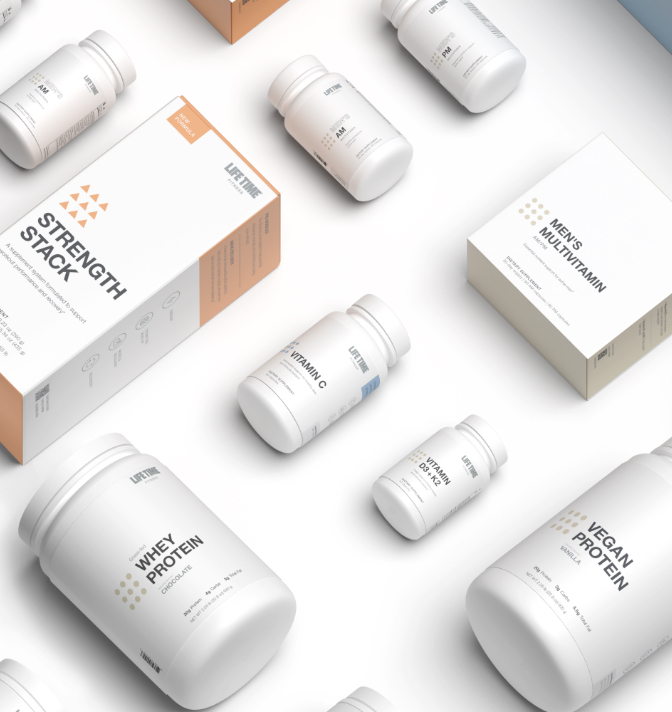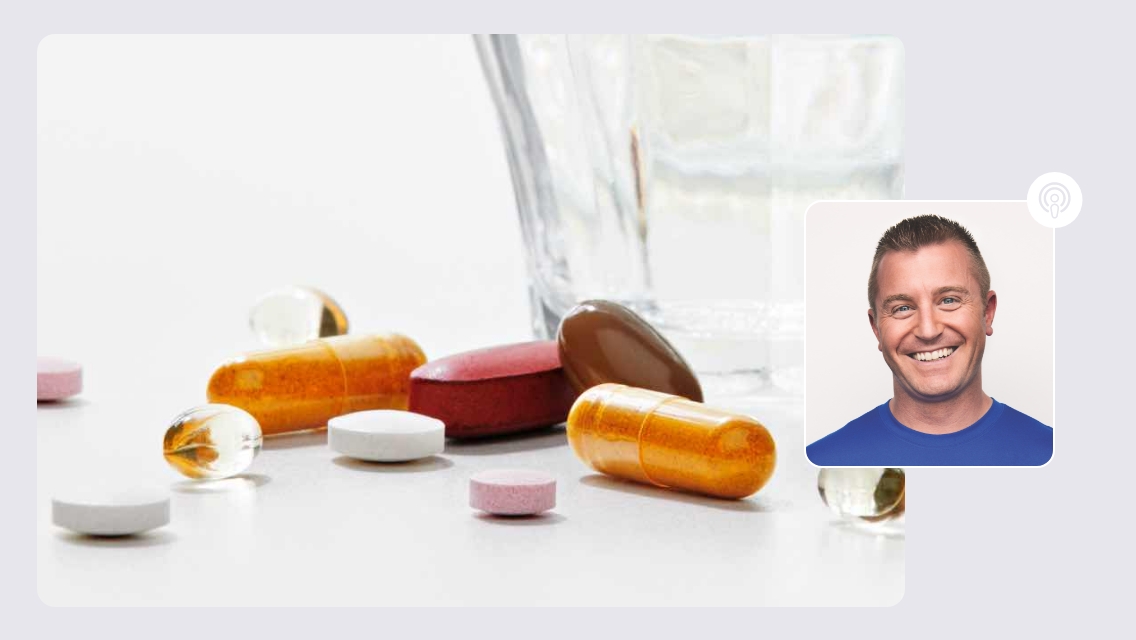As we age, aspects of our health can shift and the needs of our bodies can change — including the nutrients they require.
“Certain processes in the body naturally decline as we get older,” says Paul Kriegler, RD, CPT, director of nutritional product development at Life Time. “Muscle mass can deteriorate and taking care of your cognition and cardiovascular health becomes even more relevant. There are also some common medications used by aging adults that can deplete certain nutrients when you take them regularly. Using supplements can help combat this and keep your body strong and healthy so you can continue to feel your best.”
If you’re considering supplementation to support your health, here are some of the top supplements Kriegler recommends for healthy aging and why you might add them to your regimen.
1. Omega-3 Fish Oil
Omega-3 fatty acids, found in salmon and other fatty fish, walnuts, and flaxseeds, are linked to several health benefits that support your health as you age. But if you don’t regularly consume omega-3-rich foods, it can be challenging to meet your daily needs. That’s why a fish oil supplement can be a reliable, consistent, and economical source for most people.
“Omega-3s can help support cognition, cardiovascular health, eyesight, mood, inflammation levels, wound healing, and bone and joint health,” says Kriegler. “A fish oil supplement is an easy way to make sure your body gets these essential fatty acids to keep your brain and body strong as you age.”
Coach Paul’s pick: Life Time Omega-3 Fish Oil
2. A High-Quality Multivitamin
A multivitamin is an efficient way to get several of the necessary micronutrients your body needs — but might not be getting from the foods you consume.
“No matter what you eat, most dietary patterns are insufficient or deficient in several vitamins and minerals due to modern food cultivation,” Kriegler explains. “Soil quality, farming methods, and processing all play a role in this. A high-quality multivitamin gets these vitamins and minerals back into your body to support your health and immune system.”
A one-year randomized, double-blind, placebo-controlled study of independently living adults over age 65 found that a multivitamin or multi-mineral supplement boosted immune-system function. Compared to those receiving a placebo, the group taking multivitamins experienced fewer nutritional deficiencies, reduced frequency of illness, fewer infection-related illness days, and fewer days taking antibiotics.
Learn more: “The Ultimate Guide to Immune-Supportive Supplements”
“Another recent, well-designed study showed significant cognitive health improvements in those assigned to the basic multivitamin group,” Kriegler adds. “Consistent vitamin and mineral supplement use can help improve memory and cognition.”
Coach Paul’s pick: Life Time Multivitamins
3. Vitamin D
Approximately 80 percent of the general population is deficient in vitamin D, according to Kriegler, making it the most common nutrient deficiency. Your body makes and absorbs vitamin D from exposure to the sun, so deficiency can be worse in those who are confined indoors or don’t spend enough time outdoors. Vitamin D helps promote strong bones and plays a role in keeping the immune system healthy, both of which are important as we grow older.
“Food sources contain very little vitamin D, so dietary supplements are the way to go if you’re deficient in vitamin D,” he says.
Coach Paul’s pick: Life Time Vitamin D3 + K2
4. Magnesium
Magnesium is the second most common nutrient deficiency — and it’s involved in more than 300 different enzymatic reactions in the body. Magnesium is an important mineral for bone health, muscle function, cardiovascular health, and overall metabolic health. It also plays a role in energy production.
“Magnesium supplements are safe and easy to take, and it’s one of the top supplements I recommend for almost everyone,” says Kriegler. “One of the most interesting connections is magnesium’s link to the progression of neurodegenerative diseases. Magnesium controls synaptic plasticity, which affects learning and memory. Developing forms of dementia are real fears for aging adults, and some evidence suggests sufficient magnesium intake can help slow the progression of these diseases.”
Coach Paul’s pick: Life Time Magnesium
5. Protein Powder
Our ability to digest protein becomes less efficient as we age, which means we need more of it in our diet. We also lose more lean muscle and bone density as we get older, and one of the best ways to combat that is to consume more high-quality protein.
“Protein powder can be a great way to enhance your nutrition plan,” says Kriegler. “It takes a lot of planning and effort to prep and eat high-quality sources of protein — think meat, eggs, dairy, poultry, and fish — and supplementing with protein powder can help bridge any gaps.
“Choose a protein powder that you find easy to use consistently, and opt for no artificial flavors, sweeteners, colors, or added sugars,” he advises.
Learn more: “Which Protein Powder Is Right for You?”
Coach Paul’s pick: Life Time Grass-Fed Whey Protein
6. Collagen Peptides
Collagen supplements have been hyped over the past several years, but experts are adamant about their benefits — especially when it comes to healthy aging.
“Collagen provides the framework for most of the tissues in your body, meaning it helps strengthen your skin, muscle, and bone structure as well as your joints and connective tissues,” says Kriegler.
Collagen peptide powders often come in flavored and unflavored options, so you can easily mix them into a shake or your morning coffee as well as soup or yogurt for an easy boost.
Coach Paul’s pick: Life Time Collagen Peptides
7. Digestive Enzymes
Natural enzyme production and activity slows dramatically as we age, making protein digestion and nutrient absorption more difficult in older populations.
“Diminished enzyme activity is the most common cause of indigestion,” Kriegler explains. “But common treatments don’t address the root of the problem; they just mask the irritation or symptoms and can further diminish nutrient absorption. A digestive enzyme complex helps your body properly break down and utilize proteins, carbohydrates, and fats in an efficient manner and helps you access the nourishment from the food you eat.”
Learn more: “Digestive Enzymes: What Are They? Why Do You Use Them?”
Coach Paul’s pick: Life Time Digestive Enzyme Complex
Common Causes of Nutrient Depletion
This chart from the National Library of Medicine outlines common medications and nutrients depleted when taking them, as well as other situations that can cause nutrient depletion. Using supplements can help combat this for optimal nutrient intake.
| Nutrient Depleting Factor | Nutrients Depleted |
| Blood pressure medication | Magnesium, potassium, zinc, folate, B6, calcium, B1, vitamin C |
| Antidepressants/anti-anxiety medication | B2, B6, melatonin, CoQ10 |
| Oral hypoglycemics | Folate, B12, CoQ10 |
| Statins | Folate, B6, C0Q10, vitamin E |
| Acid-suppressing medication | Calcium, folate, iron, B12, vitamin D, magnesium, manganese |
| Antibiotics | Calcium, magnesium, potassium, B1, B2, B3, B6, B12, vitamin K |
| Oral contraceptives | B1, B2, B3, B6, B12, folate, vitamin C, vitamin E, magnesium, selenium, zinc |
| Estrogen replacement | Folate, magnesium, B6, B12 |
| Alcohol | Folate, B2, B3, B6, vitamin A |
| Poorly managed stress | Magnesium, B vitamins, vitamin C, zinc, calcium, iron |
| Sweating | Potassium, sodium, calcium, vitamin C |
| Added/excessive sugar consumption | Thiamine, riboflavin, niacin |





